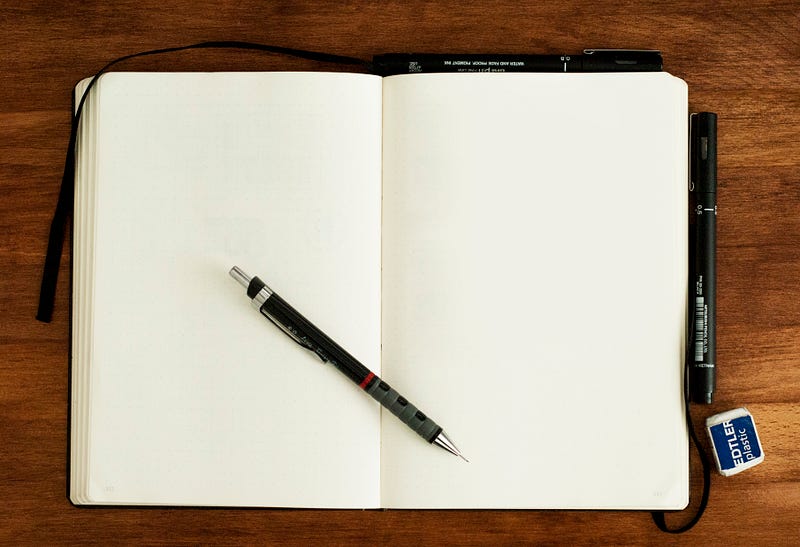The 25 Best Ways to Grow on Medium
Apr 01, 2020
The amount of advice online can be overwhelming. I save then forget. This is the one story you need to bookmark. My singular aim is to make this a story you keep coming back to. I have spent days analyzing all the stories I saved and extracted the most important information. I’ve done all the hard work so you don’t have to. I earned 100k views in my first 100 days. I was blessed with a breakout viral hit yet I plan to grow much bigger. Do you want to too? Join me on this journey.
These tips were formed by first rereading every article and making notes by hand. Then I rewrote those into clusters to compare the best advice from different amazing writers. As I wrote, I kept checking the articles to ensure I gave you the greatest insights I could.
Keep count as you read this article of how many you practice. Reply with your total and whether there’s any you love or hate!
TABLE OF CONTENTS
The Basics
1. Format Properly
2. Use attractive headlines
3. Choose standout images
The Writing
4. Learn to write better
5. Master the opening
6. Master the ending
7. Write for the audience
8. Write fast
9. Use simple language
10. Write for curation
11. Use storytelling
12. Write a blockbuster
13. Write first, edit later
The Process
14. Be consistent
15. Find your tribe
16. Plan ahead
17. Forget stats
18. Create your niche
19. Set a routine
20. Iterate
21. Target publications
22. Start an email list
23. Use social media
24. Focus
25. Have a goal
Bonus
26. Create a web of content
27. Timing and luck
The Basics
Even the greats are nothing without them.

1. Format properly
Advice from: Ayodeji Awosika, Casey Botticello, Niklas Göke, Sinem Gunel, Stephen Moore, Kirstie Taylor
“I’ve seen thousands of pieces that could have had twice the impact they did, if only the author had spent five extra minutes formatting a few different parts of their article.” — Niklas Göke
Medium didn’t waste their time building beautiful tools for formatting. The web is full of eye-opening websites and people don’t want to get lost in a wall of text. More people use the internet on their phones than their desktop now. Make it simple for them to scroll through. Varying the styling of the page makes it less intimidating. Personally, I press the back button instantly on an amateur-looking story. Luckily, Casey Botticello has created an incredible guide for this. There is nothing I can say except to follow his advice!
Recommended article: The Best Medium Article Formatting Guide — Casey Botticello
2. Use attractive headlines
Advice from: Ayodeji Awosika, Dawn Bevier, Casey Botticello, Jon Brosio, Amy Cottreau, Tim Denning, Sergey Faldin, Leigh Fisher, Zita Fontaine, Tom Kuegler, Jonah Malin, Cynthia Marinakos, Maddie Rosier, Nico Ryan, Michael Thompson
“The title of your story makes or breaks its success.” — Sinem Günel
If no one clicks on your story, then no one reads your article. Simple. It’s heartbreaking when writers pour their soul into a story but give it an unappealing headline. You don’t want to be one of these writers. Articles are not books and you shouldn’t treat them as such. People can’t pick up your book and flip it around to read the blurb. Do this in your headline and sub-headline. Always have a sub-headline. Why waste an opportunity to give the user another reason to read your article? Many writers recommend CoSchedule Headline Analyzer and I use it myself. Follow successful writers and spot their headline techniques. Anyone can write a compelling headline as long as they do the research.
Recommended article: My Bulletproof, 5-Step Process to Creating Alluring Headlines — Cynthia Marinakos
3. Choose standout images
Advice from: Ayodeji Awosika, Casey Botticello, Jon Brosio, Amy Cottreau, Sinem Gunel, Maddie Rosier, Michael Thompson
“… the cover picture of your article indeed plays a significant role in your story’s success.” — Sinem Günel
You’ve got three opportunities to draw the reader in. The title, subtitle, and image. Do I need to explain why the image is so important? Have you ever read a successful newspaper without any images? It’s more likely you’ve had your attention captured by a dramatic photo. As a test, go to the homepage. Scroll through the page fast and see what images make you stop. A poor image makes me think the writer isn’t attentive enough to put effort into their writing. You want a relevant, attractive image. If you’re artistic, you could take Darius Foroux’s approach and draw your images.
Recommended article: How to Choose the Perfect Featured Image for Your Medium Article — Casey Botticello
The Writing
We can’t escape this as a writer.

4. Learn to write better
Advice from: Ayodeji Awosika, Adrian Drew, Zita Fontaine, Jeff Goins, Sinem Gunel, Tom Kuegler, Itxy Lopez, Ali Mese, Anthony Moore, Bobby Powers, Nico Ryan
“If you want to make a living…writing, learn how to write.” — Ayodeji Awosika
This isn’t earth-shattering, but how many of us forget this? It’s been 12 years since I had my writing judged formally. I haven’t put in 10,000 hours into learning how to write better. Spelling and grammar are the easy bit. Letting go of clichés and verbose phrasing is harder. Ensuring your sentences convey your message with the greatest impact in every single line is painful. Adrian Drew gives great advice to vary sentence structure to keep the reader switched on. Use your writing to captivate your readers. I let go of my ego and accepted writing isn’t my superpower. I don’t care how good a writer you think you are. You need to approach writing with a beginner’s mind. Never stop improving your craft. Use Grammarly and the Hemingway app for a kick-start.
Recommend article: Write to Express, Not to Impress — Ali Mese
5. Master the opening
Advice from: Tim Denning, Adrian Drew, Cynthia Marinakos, Stephen Moore, Thomas Smith, Michael Thompson, Jun Wu
“Your opening paragraph is everything. It’ll make or break you.“ — Adrian Drew
You’ve got someone to click on your article. Don’t lose them in the first few lines. Readers have limited time and unlimited potential articles. A weak opening means they’ll regret their choice and leave. Openings are hard. School teaches us to set the scene and the context. You must charm, else it doesn’t matter about the mind-blowing revelation of paragraph 12. Don’t start boring. The inverted pyramid technique is a useful framework. Put the greatest parts first so the reader becomes invested and continues through the rest.
Recommended article: The 6–15–7 Rule Behind Sticky Blog Posts — Thomas Smith
6. Master the ending
Advice From: Casey Botticello, Shaunta Grimes, Stephen Moore, Maddie Rosier, Michael Thompson
“It’s your opportunity to control what thoughts, actions and motivation the reader leaves with.” — Stephen Moore
You want loyal fans right? So do I. If a writer makes me feel like I’ve gained something from their article, I’ll probably click on them next time too. The last thing you want is a reader to read your story and believe they’ve wasted their time. Give your reader a bit of dopamine at the end. Make them feel emotion, confusion doesn’t count. Political articles may want the reader to be angry. Does your ending achieve this? I want my readers to leave my stories and be optimistic. I usually end with a concise roundup. I thank them for reading and wish them a great day. Maybe it only makes one percent smile, but it’s worth it to me.
Recommended article: 8 Steps To Making Money on Medium — Michael Thompson
7. Write for the audience
Advice from: Shannon Ashley, Ayodeji Awosika, Steve Campbell, David O, Nico Ryan
“Don’t be too smart. Just write what people want to read.” — David O.
People will only read your article if it adds value to their life. Don’t be selfish or self-absorbed. You are publishing this online and expecting to be paid so don’t write as if it’s your journal. Most people aren’t reading as a favor to you. It’s about them, not you. If it’s not obvious, they can press the back button and read one million other articles that are clear. When you promise something to readers, you better deliver. For humor pieces, make them laugh. For self-help pieces, make them grow. For health pieces, make them healthier. A writer who writes for me is refreshing and will keep me reading to the end.
Recommended article: How To Make More Time To Write And Compel More People To Read It — Steve Campbell
8. Write fast
Advice from: Ayodeji Awosika, Sinem Gunel, Megan Holstein, Sean Kernan, Brian Rowe
“Ultimately, writing any of your creative work fast is a practice you should learn to fall in love with.” — Brian Rowe
I write slowly. It can take me a long time to produce a piece I’m happy with. Yet this advice is simple at heart. Time is limited. The faster you can write high-quality pieces, the more high-quality pieces people can read. Ideally, you want to reach a flow state of mind without mind and avalanche the words to the page. Writing fast can force you to trust your intuition rather than doubt good ideas. I dread to do this but work out your earnings per hour. If you spend eight hours writing a piece and it earns $8 then you’re on $1 an hour. The faster you can write, the more valuable your writing time is.
Recommended article: How to Write Faster: 10 Ways to Skyrocket Your Writing Speed — Ayodeji Awosika
9. Use simple language
Advice from: Adrian Drew, Sinem Günel, Toni Koraza, Itxy Lopez, Cynthia Marinakos, Stephen Moore, David O., Jonah Malin, Nico Ryan
“Simple is always better.” — Stephen Moore
I thought writing was about showing off my flabbergasting vocabulary. It’s not. Make the reader’s lives easy. They are here for your story and words are just the medium. I will not read a 20-minute story if I need to google word definitions every ten seconds. Would you? This isn’t high school. You don’t need to make sentences and words longer to reach a certain number of pages. Be ruthless with yourself. It’s tough but a bit more time spent by you could mean a lot more time spent by your readers.
Recommended article: How to Write Easy-to-Read Content Even Your Cat Will Enjoy — Toni Koraza
10. Write for curation
Advice from: Ayodeji Awosika, Casey Botticello, Jon Brosio, Richie Crowley, Tim Denning, Sinem Gunel, Sean Kernan, Tom Kuegler, Amber Radcliffe, Kirstie Taylor
“Curators are the gatekeepers of Medium’s coveted homepage.“ — Casey Botticello
For those unfamiliar with curation, read Medium’s official guidelines. Curation means Medium editors will send your content to people interested in relevant topics. Even gods of Medium such as Tom Kuegler, Sean Kernan, and Ayodeji Awosika have admitted to dud articles without curation. Gaining a following is important, but the ability to churn out curation-quality articles matters more. If you follow the advice of the other points within this article, then you’re well on your way. Curation is never guaranteed, but it is a choice to not know how to give yourself the best chance. These curators need to read thousands of articles a day so make their jobs easier!
The best article: 11 Things You Need to Know About Medium Curation — Tim Denning
11. Use storytelling
Advice from: Zita Fontaine, Jonah Malin, David O, Michael Thompson, Marek Veneny, Jun Wu
“And stories are the perfect vessels for emotions.” — Marek Veneny
We humans freaking love stories. According to Yuvah Noah Hariri, it’s why we outlasted the other human species. We’re addicted to it. It’s hard to miss as we binge on Netflix and the news. If you can weave stories into your article, then you are appealing to the way we think. People read here for enjoyment. Don’t sound like a textbook. Anecdotes back up our message and add credibility. Dr. Barbara Oakley, who wrote the course on learning, advises us to use stories to remember complex facts. When readers can relate, more areas of their minds get stimulated. You want to be remembered. Do you need any more reason to use stories?
Recommended article: Make Your Next Medium Story Go Viral: A Marketing Professor Shares His Research — Marek Veneny
12. Write a blockbuster
Advice from: Helen Page, Maddie Rosier, Michael Simmons
“You never know when the viral gods are watching.” — Helen Cassidy Page
Did you know the most populous fish are bristlemouths? If you saw a million bristlemouths or one great white shark, what are you going to look at? The web is the same. It’s full of unmemorable articles and we all read the blockbusters. Aim to be the definitive post on your topic with your angle. It need not be epically long, but it needs to be exceptional. I am guilty of writing confessed okay stories. I spent a long time on these and it shows in their quality and success. Write each article as if it could go massive. It’s too easy to see an okay article do well and think that’s enough. Yet if you made the same story incredible, how much better might it have done?
Recommended article: The #1 Mental Model For Writers Who Want To Create High-Quality, Viral Content — Michael Simmons
13. Write first, edit later
Advice from: Ayodeji Awosika, Nicole Bianchi, Amy Cottreau, Sergey Faldin, Zita Fontaine, Michael Leonard, Stephen Moore, Maddie Rosier, Michael Thompson
“Write like you talk, but edit like every word costs money.” — Stephen Moore
Writing and editing are two different skills. When you write you want to get all your ideas down without disrupting your flow-like state. Afterward, you can worry about word choices and styling. I consider editing as a distraction to writing. It’s no better than me checking my phone. Yet I suck at not editing while I write. This is an area I need to improve. I understand the benefits and need to keep experimenting to become more competent. When I master this, I will be far more productive with my limited content creation time.
Recommended Article: How to Produce Consistently High-Quality Content — Zita Fontaine
The Process
Success is so much more than just writing.

14. Be consistent
Advice from: Shannon Ashley, Ayodeji Awosika, Manj Bahra, Casey Botticello, Brett & Butter, Jon Brosio, Nicolas Cole, Tim Denning, Danny Forest, Megan Holstein, Itxy Lopez, Jack Heimbigner, Cynthia Marinakos, Anthony Moore, Leo Serafico, Kirstie Taylor, Marek Veneny, Jun Wu
“So if you want to be successful, you have to be in it for the long-haul. Plain and simple.” — Kirstie Taylor
Consistency was the undisputed most common advice in the 500 articles. To run a marathon you need to keep taking one more step to move forwards. Put out quality regularly and readers will recognize you and you will gain credibility. I saw both Sinem and Itxy do 30-day writing challenges with fantastic results. For balance in my life, I’m not willing to publish this often and sacrifice my other passions. Instead, I plan to take Ayodeji’s challenge of writing three to five times a week for 90 days. All the top writers are writing this often if they didn’t bring across followers from elsewhere as Casey Botticello shows. After this article, I begin my Ayodeji challenge.
Recommended article: The Secrets to Consistently Make $10,000 Per Month Writing — Ayodeji Awosika
15. Create your tribe
Advice from: Nicole Akers, Richie Crowley, Zita Fontaine, Leigh Fisher, Danny Forest, Tom Kuegler, Niklas Goke, Michael Leonard, Itxy Lopez, Stephen Moore, Maddie Rosier, Leo Sarafico, Michael Thompson
“Surrounding yourself with likeminded people is the greatest thing you can do for yourself.” — Zita Fontaine
It’s easy to fall into a trap of seeing readers as numbers. Look at all those top writers up there. They all have all built a network of friends by supporting each other. Find a tribe who will support you and push you from good to great. Seek out people who challenge you and who you vibe with. The number of people I trust to send drafts to is growing and my enjoyment has skyrocketed. Did you know a supergroup of Danny Forest, Maarten van Doorn, Matt Sandrini, Brian Pennie, Michael Thompson, and Niklas Goke went to Barcelona together? I want a supergroup like theirs. Aim for real human connection with other writers, not clap farms.
Recommended article: How To Connect Online with People You Admire — Michael Thompson
16. Plan Ahead
Advice from: Shannon Ashley, Ayodeji Awosika, Steve Campbell, Leigh Fisher, Zita Fontaine, Michael Leonard, Brian Rowe, Michael Thomspon
“The more you plan ahead, the more successful you’ll be.” — Brian Rowe
Don’t try to do everything all at once. Spend a little time strategizing so next time you write, you can get straight into the zone. You’ll have some more creative days than others and use these to track all your ideas. I don’t understand the writers who have nothing to write about. I have 50 headlines of articles I want to write. I track everything in Airtable. I strongly advise you to create a streamlined system too. Several top writers create the outlines for their articles before they write it. I do this myself and it makes my writing time much more productive.
Recommended article: 3 Tips to Dramatically Improve Your Writing Skills in 90 Days or Less — Ayodeji Awosika
17. Forget stats
Advice from: Shannon Ashley, Tim Denning, Danny Forest, Niklas Göke, Zita Fontaine, Tom Kuegler, Itxy Lopez, Stephen Moore
“Stats are the bane of a writer’s existence. They give you a sense of control where you have none.” — Niklas Göke
I love stats and have spent way too long checking them in the past. Medium provides these overall for the past 30 days and for each article. Stop over-analyzing them. I haven’t checked my earnings at all in April. It makes zero difference to my strategy. Story success has many variables and quality is only one part. Correlation doesn’t equal causation despite what many might have you believe. We can’t use tiny samples of a handful of articles to conclude. The people who’ve given this advice have massive sample sizes. If they can’t draw meaningful lessons then 99% of writers can’t.
Recommended article: Why Your Medium Stats Don’t Matter — Niklas Göke
18. Create your niche
Advice from: Shannon Ashley, Manj Bahra, Casey Botticello, Amy Cottreau, Tim Denning, Jack Heimburger, Anthony Moore, Jun Wu
“People typically think about a niche simply as a topic, but I believe in honing your voice to be your ideal niche.” — Shannon Ashley
I love this quote from Shannon Ashley. She has crafted a fantastic writer’s voice that oozes skill and charisma. For many writers, it takes time to figure out your niche and that’s okay. Not everyone has a master plan but you need to start designing. When you’re a skilled writer, you might flit around and still deliver quality like Shannon. Yet when starting, it helps to write about a few topics and become excellent at writing about them. Don’t be mediocre at writing in 15 topics. Choose up to five and strive for excellence. Find areas you love researching and write about those. Once you’ve found that area then you have to own it. Be the person who others run towards.
Recommended article: How I Made $11,000 From Writing in 30 Days — Tim Denning
19. Set a routine
Advice from: Amanda Warton Jenkins, Ayodeji Awosika, Steve Campbell, Tim Denning, Zita Fontaine, Sean Kernan, Michael Leonard, J.J Pryor, Maddie Rosier, Brian Rowe
“If you don’t keep the process enjoyable, you won’t last.” — Sean Kernan
What’s amazing about reading all these saved stories is even the geniuses struggle sometimes. Those who reach the top have a process and they find what works for them. Take tips from other writers, but they aren’t you. Only you can set a routine for your best productivity. It’s unlikely to include five minutes of writing followed by 30 minutes of procrastination though. Are you a morning writer or an evening one? At your desk or in bed? Routines and habits set you up for sustainable success when done right. Don’t overdo it and burnout after your first week. Several writers make it clear that breaks are needed for their mental health and producing their best content.
Recommended article: 20 Lessons From Making $20,050 as a Writer in 30 Days — Michael Leonard
20. Iterate
Advice from: Ayodeji Awosika, Niklas Goke, Sean Kernan, Anthony Moore, Michael Thompson
“First, focus all your efforts on being better. Put in a huge volume of work. Study the greats. Learn from them. Experiment, fail, and then try again. See what works, and cut out what doesn’t.” — Anthony Moore
Some writers will tell you to ignore all other advice and keep writing hundreds of articles. I respectfully disagree. Don’t go through the motions and produce a pile of uninspired content. Each article is an opportunity to improve. Find out what works and what doesn’t and make it better next time. Why take 500 articles to learn what was evident after 20? Cheat and learn from others. If I see someone touch fire and burn their hand, I don’t need to touch the fire myself to learn the lesson. Absorb the experiences of others and you need fewer experiments to reach your vision of success.
Recommended article: How to Make Your First $1,000 (And Beyond) On Medium — Ayodeji Awosika
21. Target publications
Advice from: Ayodeji Awosika, Casey Botticello, Jon Brosio, Tom Kuegler, Richie Crowley, Sinem Gunel, Jonathan Hsu, Jonah Malin, Anthony Moore, J.J. Pryor, Amber Radcliffe, Leo Sarafico
“I attribute all of my success in getting my work into popular publications.” — Amber Radcliffe
Publications allow your post to be seen by another audience. Most publications have particular themes and editorial standards. For a new starter, it is a quick way to get more eyeballs on your work. Be careful as the most worthy publications have high standards. They can have long wait times for responses and some don’t reply at all. If you choose the right publication where their message aligns strongly with yours, your story will be shown to a captive audience. Publications are not a golden ticket. You can reach the editor’s standards and not a reader’s. Look at the legions of barely read posts from top publications for evidence.
Recommended article: The Ultimate Guide to 43 Active Publications on Medium — J.J. Pryor
22. Start an email list
Advice from: Casey Botticello, Richie Crowley, Tim Denning, Shaunta Grimes Megan Holstein, Anthony Moore
“The single most important thing an independent writer can do is maintain a mailing list.” — Megan Holstein
We can’t directly message our followers on this platform. Creating an email list means we can directly engage with people who care. They are more likely to see your email than see your article on their homepage. Emails have six-times higher clickthrough rates than tweets. Imposter syndrome made me late to the email game. I didn’t think anyone would care enough to want to see me pop up in their inbox. I was wrong and wish I had started earlier. Don’t be aggressive, just give the option. I like Richie Crowley’s advice of keeping it to a monthly newsletter. This way you can deliver strong content every time and make the receiver more likely to want to open.
Recommended article: How to Create a Substack Newsletter — Casey Botticello
23. Use social media
Advice from: Ayodeji Awosika, Casey Botticello, Tim Denning, Zita Fontaine, Niklas Goke, Tom Kuegler, Itxy Lopez, Leo Sarafico, Michael Thompson
“That reader could become a hardcore fan who reads your stories every time from there on out.” — Itxy Lopez
This was the most divided advice across the sample. Some writers have formed support groups on Facebook. New writers ask questions and people promote their posts. What people like Ayodeji, Tom and Tim have a problem with is the complaints. They found there to be too much negativity and not enough work. I am a moderator for Medium Dreamers. It’s a great place for discussion with other writers and I have benefited massively. The groups are best when you engage with others and grow together. Most writers do use some form of social media to market their stories. Twitter is full of us. Quora is another popular place for top writers. You can reach new audiences yet don’t expect hundreds of millions to read your article from one share.
Recommended article: 5 Things You Need to Start Doing on Medium to Get More Attention — Itxy Lopez
24. Focus
Advice from: Ayodeji Awosika, Steve Campbell, Nicolas Cole, Sean Kernan, Cynthia Marinakos, Michael Leonard, David O
“The more times I am pulled out of the flow, the longer it takes for me to write a piece.” — Nicolas Cole
Are you able to call a friend, walk the dog, check the latest Twitter gossip and write a story all at once? If you are then congratulations, you are exceptional. For us mere mortals, we have to block out distractions and focus on getting stuff done. There is such a thing as overthinking and not taking any action. Thinking about how awesome your article will be while you scroll through Instagram will not help. You need to be honest with yourself and find a time when you can turn off notifications and not be disturbed. I’m writing this with two windows open with only one tab each; the editor and my notes. My phone is in the other room. I will not stop writing until my timer goes off.
Recommended article: 8 Ways to Be a More Productive Blog Writer — Brian Rowe
25. Have a goal
Advice from: Shannon Ashley, Ayodeji Awosika, Andy Chan, Zita Fontaine, Sean Kernan, Itxy Lopez
“I want to set a huge, insane goal that makes no sense, and I want you to set one too.” — Itxy Lopez
I am ambitious. I didn’t want to be in the top 20% of Medium writers. This would mean I was still earning way less than $100 a month. I don’t want to be in the top 7–8% either. I will be in the top 1%. Some writers are held back by low goals. If you want to earn money but think it’ll just happen, then you can’t be surprised if it doesn’t. Go to the profiles of the writers mentioned and you can feel the hunger radiate from everything they do. Andy Chan makes a good point of always underestimating your targets. If you want to make $1000 and think each article will earn $100, write 20 articles instead. Don’t do just about enough to reach your goal, aim to destroy it earlier if you can.
Recommended article: 4 Lessons From Consistently Making 4 Figures on Medium—Andy Chan
Bonus
Set high expectations. Overdeliver.

26. Create a web of content
Advice from: Casey Botticello, Nicolas Cole
“The secret to success is to build a massive web of content that stretches all across the internet.”—Nicolas Cole
This is a more advanced tip. If you are writing consistently in a few topics, then aim to build a complete library of relevant information. Think about how your presence across the web fits into one neat narrative. Don’t serialize writing for the sake of it but cluster information so the reader can get lost in your web of articles. I did this with my articles about Japan. The original listicle has spawned four child stories and a success story. When a reader likes my work I make it easy for them to read more. Creating a wealth of connected content positions you as an expert in an area. With greater credibility, you’ve got a more compelling reason for readers to trust you.
Recommended article: The Easiest Way to Build Your Personal Brand: 5 Simple Strategies — Nicolas Cole
27. Timing and luck
Advice from: Shannon Ashley, Ayodeji Awosika, Casey Botticello, Zita Fontaine, Niklas Goke
“It needs the right mixture of quality, timing and luck.” — Zita Fontaine
I praise anyone who can admit luck is part of their success. None of us have exact knowledge of what will go viral. There are plenty of great writers on Medium who just haven’t had one breakout hit. Ayodeji and Niklas both confess they were lucky to build their Medium careers when they did. When the Medium Partner Program started they had already spent years on their writing. Yet many writers started when they did, and only a few iterated and kept getting better. If you run marathons all the time, you are more likely to have a bird poop on you than someone who occasionally runs a kilometer.
Recommended article: An Exact Breakdown of My First $2,000 Medium Story — Amardeep Parmar (As far as I know, I’m the luckiest writer I’ve seen!)
Thank You
There is no one path to success, but this is the advice from those who’ve made it. Tom Kuegler, for example, had different viewpoints for many others. He doesn’t plan, and he edits while he writes. It’s working pretty well for him. Take this advice, read these stories, but forge your path. If you want the best results from this story, then read all the stories and make your notes. Carve the knowledge into your mind by putting in the effort.

